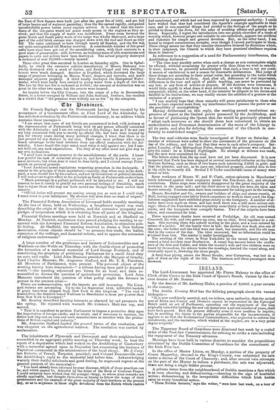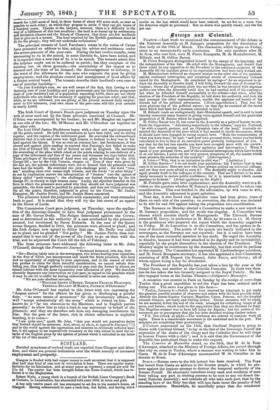IRELAND.
The Lord-Lieutenant has appointed Mr. Pierce Mahony to the office of Clerk of the Crown to the Irish Court of Queen's Bench, vacant by the re- cent demise of Mr. Bourne.
By the demise of Mr. Anthony Blake, a pension of 3,000/. a year reverts to the country.
The Dublin Evening Mail has the follwing paragraph about the vacant bishopric-
" It is now confidently asserted, and, we believe, upon authority, that the united sees of Down and Connor and Dromore cannot be represented on the Episcopal Bench until an act of Parliament, spreading out the repayment of the loan originally raised for building the new see-house over a certain number of years, shall have been passed. How the present difficulty arose it were needless to inquire; but, in ascribing the blame to the parties responsible for the inconvenience, it appears to us that the Ecclesiastical Commissioners, who neglected to enforce the instalments, and the executive, which winked at the neglect, are to a very great degree culpable."
The Tipperary Board of Guardians were dismissed last week by a sealed order of the Poor-law Commissioners, for refusing to strike a rate including the repayment of the Treasury advances.
Meetings have been held in various districts to consider the propositions circulated by the Dublin Committee of Guardians for the amendment of the Irish Poor-law.
Li the office of Master Litton, on Monday, a portion of the property of Count Magawley, situated in the King's County, was submitted for sale under a decree of the Court of Chancery; and, after several vain attempts on the part of the Master to induce a purchaser, the sale was adjourned, there not being a single bidder present.
A private letter from the neighbourhood of Dublin mentions a fact which is at once cheering and disheartening,—cheering in the sign of healthful action; disheartening in the insuperable difficulties which Irish habits raise to every beneficial action.
"Three Norfolk farmers," says the writer, "were here last week, on a tour of search for 1,200 acres of land, in three farina of about 400 acres each, as near as aosib1c to each other; on which they propose to settle if they can get leases of a hundred years. Thanks to the lawyers, however, there is a difficulty in the way of a fulfilment of this last condition: the land is so bound up by settlements and limitation-clauses and the fetters of Chancery, that there are few landlords free to give such a tenure. The land required by the Norfolk gentlemen must be fit for the plough; they will not undertake reclamation."
The principal tenants of Lord Farnham's estate in the union of Cavan have presented an address to him, asking his advice and assistance under the severe pressure of the poor-rate. During the last twelve months, rates amounting to 6s. in the pound, in some districts 8s., have been levied, and it is reported that a new rate of 3s. is to be struck. The tenants admit that the helpless ought not to be suffered to perish; but they complain of the existing law, on three grounds,—the uncertainty of the impost as to amount and the time of its demand; the discouragement to industry, in the want of due allowance for the man who supports the poor by giving employment; and the absolute control and management of local affairs by a distant central board. The tenants describe their landlord's own case as one of peculiar hardship— "In your Lordship's case, we are well aware of the fact, that (owing to the fostering care of your Lordship and your predecessor, and the hitherto prosperous state of year tenantry) out of a population exceeding 8,000, there are not thirty individuals who are under the necessity of applying for poor-law relief; and that, while, as we are informed, you are giving at the present moment daily employ- ment to 250 labourers, your own share of the poor-rates will this year amount to nearly 4,000/.
The Irish Court of Queen's Bench gave judgment on Tuesday upon the writ of error sued out by the State prisoners convicted at ClonmeL Mr. O'Brien was accompanied by his brother; he and Mr. Meagher sat together at one side of the bar; Mr. M‘Manus and Mr. O'Donohoe sat together on the other side.
The Lord Chief Justice Blackburne began with a clear and rapid summary of all the points raised. He held the commission to have been valid, and its sitting regular, and the caption of the indictment good. He overruled the extraordinary doctrine that it is not and never was high treason in Ireland to levy war in Ire- land against the Queen. It was so even at common law: but furthermore, it was absurd and against plain reading to contend that Poyning's law failed to make the 25th of Edward III, the law of Ireland as well as England. He sustained the overruling of the pleas which relied on the points relating to non-delivery of a copy of the indictment and lists of the jurors and witnesses ten days before trial. Those privileges of the statute of Anne were not given to Ireland by the 57th George HI.; nor by the 11th Victoria, chapter 12. Even if they were given by the last act, the present indictments were not so framed that the prisoners could have had the benefit. He overruled the jury-challenge point: the word "trea- son" standing alone ever means high treason, and the words "or other felony" do not by implication narrow the interpretation of "treason" into the species of felony called "petit-treason": the challenges are limited therefore by the 9th George IV. to twenty in high treason cases. Lastly, the objection founded on the form in which the prisoners were asked why they should not have judgment was untenable; the form used is justified by precedent, and does not violate principle. On all the points, therefore, judgment is given for the Crown. Mr. Justice Crampton, Mr. Justice Perrin, and Mr. Justice Moore concurred. The prisoners heard thejudgments with equanimity, and were remanded back to gaol. It is stated that they will try the last resort of an appeal to the House of Lords.
The Commission Court gave judgment, on Thursday, upon the applica- tion of the Attorney-General to have final judgment pronounced in the case of Mr. Govan Duffy. The Judges determined against the Crown; and so determined on the authority of a case overlooked by the prisoner's counsel, but mentioned by Baron Richards. In the case of the Queen versus Sargent, decided in 1845, the prisoners were allowed to plead; and the Irish Judges now agreed to follow that case. Mr. Duffy was called on to plead, and he pleaded "Not guilty." Mr. Justice Perrin then inti- mated that it was out "of the power of the Court to go on then with the trial, and he adjourned. the Court till the 6th of February.
The State prisoners have addressed the following letter to Mr. John 'O'Connell, through the Freeman's Journal-
" Richmond Bridewell, 12th Jan. 1849.
"Sir—Having lately seen in the newspapers, two letters bearing your signature, in the first of which you misrepresent and insult the State prisoners, who have now no opportunity of replying to your aspersions, and in the second of which you profess to claim for them merciful consideration, we cannot refrain from telling you, that though perfectly contented to pass over the former in silence, we cannot tolerate with the same equanimity your affectation of pity. We therefore sincerely deprecate any intervention on your part, in regard to the penalties which it may "We our lot to suffer for having endeavoured to serve our country.
We are your obedient servants,
"WILLIAM SMITH O'BRIEN, THOMAS FRANCIS MEAGHER, TERENCE BELLEW M`MANUS, PATRICK OTIONOHOE."
Mr. John O'Connell has replied to this letter with one expressing the "deepest sorrow" for the offence he has given in discharging a painful duty. "As some means of atonement" for this involuntary offence, he will "accept submissively all the scorn" which is visited on him. He knows he is "far too obnoxious to the Ministers, and to English parties generally," to allow him to take a lead in any movement in behalf of the prisoners; and they are therefore safe from any damaging interference by him. But the gem of the letter, rich in obtuse adherence to exploded humbug, is to come-
" I am quite sure," quoth Mr. John, "that you would not yourselves desire that Ireland should be quiescent. And, about, as she is, to appeal to Europe (11!) and to the world against the oppressions and miseries so ruthlessly inflicted upon her, it did appear to me imperatively necessary at the very outset to meet the at- tacks of the English press by the species of protest which I embodied in my letter of the 1st of this month."



























 Previous page
Previous page